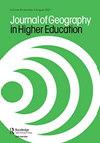Understanding the ‘degree awarding gap’ in geography, planning, geology and environmental sciences in UK higher education through peer research
IF 1
4区 教育学
Q2 EDUCATION & EDUCATIONAL RESEARCH
引用次数: 2
Abstract
ABSTRACT This paper draws on critical race theory to analyse testimonies from students that help explain why minoritised ethnic communities studying geography, planning, geology and environmental sciences in the UK, have a lesser chance of being awarded a ‘good’ degree (i.e. an upper second- or first-class), in comparison to White British people. There are very low levels of ethnic diversity across these subject areas. We conducted peer research, including student-led semi-structured interviews at one British university over a five-month period (involving 38 participants in total). Our analysis explores the processes of minoritisation owing to cultures of Whiteness. These relate to teaching and learning spaces, off-campus encounters, university societies, student representation/committees, social interactions, part-time employment and caring responsibilities. We conclude with a call for action to reframe and disassemble the ‘degree awarding gap’ through student and staff co-design of policies and actions that will not only confront, but also subvert exclusionary cultures of Whiteness in its various manifestations across university life.通过同行研究了解英国高等教育中地理、规划、地质和环境科学的“学位授予差距”
本文利用批判种族理论来分析学生的证词,这些证词有助于解释为什么在英国学习地理、规划、地质和环境科学的少数民族社区与英国白人相比,获得“好”学位(即二等或一等)的机会更少。这些学科领域的种族多样性水平非常低。我们进行了同伴研究,包括在一所英国大学进行的为期五个月的由学生主导的半结构化访谈(总共涉及38名参与者)。我们的分析探讨了由于白人文化导致的少数化过程。这些涉及教学和学习空间、校外相遇、大学社团、学生代表/委员会、社会互动、兼职工作和照顾责任。最后,我们呼吁采取行动,通过学生和教职员工共同设计政策和行动,重新构建和消除“学位授予差距”,这些政策和行动不仅会面对,而且会颠覆大学生活中各种表现形式的排外白人文化。
本文章由计算机程序翻译,如有差异,请以英文原文为准。
求助全文
约1分钟内获得全文
求助全文
来源期刊

Journal of Geography in Higher Education
Multiple-
CiteScore
5.80
自引率
9.50%
发文量
29
期刊介绍:
The Journal of Geography in Higher Education ( JGHE) was founded upon the conviction that the development of learning and teaching was vitally important to higher education. It is committed to promote, enhance and share geography learning and teaching in all institutions of higher education throughout the world, and provides a forum for geographers and others, regardless of their specialisms, to discuss common educational interests, to present the results of educational research, and to advocate new ideas.
 求助内容:
求助内容: 应助结果提醒方式:
应助结果提醒方式:


